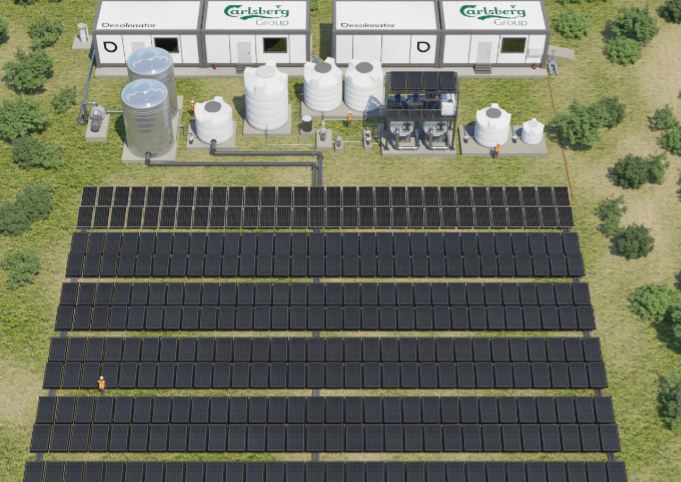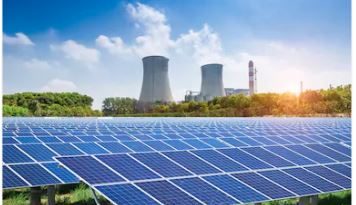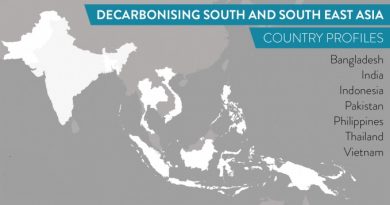Leading Global Brewer Carlsberg Backs Sustainable Water Project In The Sunderbans

The Sunderbans delta, that has borne the brunt of early climate change impact so far, in the form of both soil erosion, as well as more, higher intensity storms in recent years, has always been a tough environment to make a living in for people living there. Making it tougher has been access to drinking water, with most of the delta overrun by the tides of the Bay of Bengal.
After the recent Cyclone Amphan, water even had to be trucked into some areas. The corporate social responsibility (CSR) project from Carlsberg will be welcome, therefore.
The sustainable desalination project, due to complete mid-2021, will create 20,000 litres of clean drinking water using the heat and power of the sun. A community-led water distribution model, designed in partnership with WaterAid and Strathclyde University, will empower local women entrepreneurs by providing employment.
For Carlsberg, this is pat of the firms ‘Together Towards ZERO’ sustainability programme. It aims to eliminate water waste across its breweries by 2030 and to protect shared water resources in high-risk areas.
The Sunderbans basin was identified after Carlsberg, using WWF, using its Water Risk Filter, identified its highest-priority sites and the water basins that they draw from. Including all seven of its Indian breweries.
The Sundarbans, West Bengal, around 120 km from Carlsberg’s Kolkata brewery, and home to around 4.7 million people, is at a critical point. An area surrounded by salt water, suffering the immediate consequences of rising sea levels. Climate change causes changing weather patterns and more extreme events.
Desolenator’s sustainable water purification system is 100% solar-powered, harvesting thermal and electrical energy to distil water. This allows it to create high-quality water from the most complex sources, delivering transformative impact for communities without damaging the environment.
Key to the project’s success is to understand how people will access the water created. A community-led distribution model is being designed through a global, multidisciplinary partnership including the local expertise of NGOs WaterAid and the Sundarbans Social Development Centre, leading researchers from Strathclyde University in the UK, and grant support from the Netherlands Enterprise Agency. Tailored to the lives and needs of the people of South 24 Pargana’s district, the distribution model will create employment for female micro-entrepreneurs, empowering people and families within the community.
Cees ‘t Hart, CEO, Carlsberg Group said: “Through our Together Towards ZERO programme, Carlsberg is committed to developing partnerships to protect shared water resources in our high risk areas.
Water is one of the four main ingredients in beer and healthy communities with access to clean and safe water is a prerequisite for our breweries around the world. Working in partnership to introduce innovative technology, Carlsberg can help local communities with access to clean water, building on our history of science and innovation and citizenship,” says CEO Cees ‘t Hart.
Rishi Chawla, Vice President Corporate Affairs, Carlsberg India said: “India is already experiencing the global water crisis. This collaboration has huge potential both in creating a sustainable solution to the crisis and at the same time providing the opportunity to engage women from the local community to lead and manage the distribution of this precious resource.”
VK Madhavan, CE, WaterAid India said: “In the South 24 Pargana’s district, high levels of salinity make the water unfit for human consumption, placing a huge burden on families. The ebb and flow of the water from the rivers leads to huge daily variations in the levels of salinity making purification a challenge. This desalination plant is designed to handle such variations and by virtue of its reliance on solar energy makes this an attractive and sustainable option. Success, not just of the technology but community-based management of the infrastructure could inspire expansion into other flood-prone areas with a similar challenge with regard to water quality”.
Louise Bleach, development and Impact Lead at Desolenator, said: “We are proud to partner with Carlsberg, a company whose 2030 goals are setting the standard for corporate sustainability. As project manager, it’s been a privilege to work with such incredible cross-sector organisations, as well as the women entrepreneurs in the Sundarbans. The impact of this collaboration goes beyond the provisioning of clean water. It is a demonstration to the transformational potential of convening partners around a shared vision of the future. When it comes to global sustainability, we are all stakeholders and it is a goal we can only hope to achieve together.”




